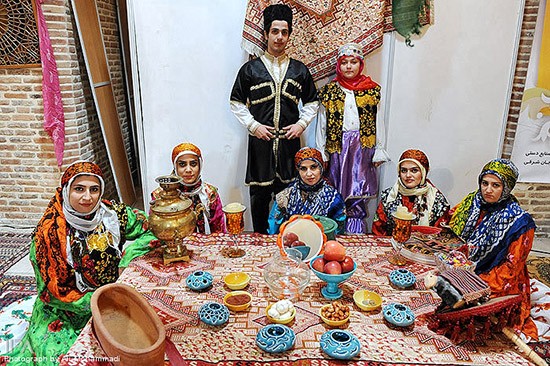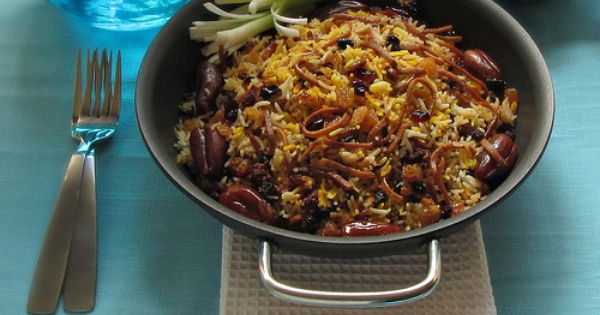Nowruz is the traditional Iranian festival of spring, which starts at the exact moment of the vernal equinox and is usually celebrated on March 20 or 21.
Till today, the celebration of Nowruz begins with the tradition of cleaning the house or spring cleaning as is the popular English term, which was probably where the term spring cleaning came from.
You may like to read
Today, the festival of Nowruz is celebrated in many countries all over the world. Besides Iran and India, Iraq, Afghanistan, Tajikistan, Uzbekistan, Azerbaijan, Kazakhstan, and Kyrgyzstan also celebrate Nowruz. But just as Navroze celebrations here are all about family, friends, food, and good times, Nowruz celebrations in Iran also begin with the families visiting each other and friends dropping in to give their good wishes, gifts being exchanged, and new clothes for children and family meals.

Image credit- http://www.learnpersianonline.com
Like any good holiday, food plays a major role at Nowruz. Having at the feast is half the reason for everyone to get together. There are specific foods associated with Nowruz: noodles for untying life’s complications, fresh herbs for rebirth, eggs for fertility, and fish for life.
Sabzi polo mahi- rice tinted vivid green with green herbs and served with fried fish is an extremely popular Nowruz dish.
Sabzi polo is a bright green version of the famous Persian ‘polo’ or ‘pilaf rice dishes. The vivid green color comes from a variety of herbs that give an otherwise plain dish a sublime flavor. Pair sabzi polo with fried fish; and you have sabzi polo mahi, the traditional Persian New Year meal.
Reshteh polo is another Persian aromatic rice and noodle pilaf layered with meat that is traditionally served the night before the spring festival of Nowruz.
Par-cooked rice and noodles are layered with a bewitchingly fruity and aromatic meat mixture which is gently steamed in the traditional Persian manner.
Reshteh Polow (pulao) with meat

Ingredients:
1 ½ cups, basmati rice,
Salt as needed,
½ cup rose water,
2 large bay leaves,
113 grams Reshteh (flat noodles like fettuccine broken into 1-inch pieces),
Oil as needed,
1 large onion thinly sliced,
1 kg. mutton, cut into small pieces,
2 tsp. cinnamon powder,
½ tsp. turmeric,
¼ tsp. nutmeg powder,
1 tsp smoked paprika or chili powder,
Peel of 1 orange bitter white pith removed and skin cut into thin long strips,
½ cup golden raisins,
12 large Iranian dates, cut in half, de-pitted and chopped,
1 tsp salt,
1 tsp pepper,
3-4 tbsp. butter/ghee,
1 tsp. saffron, crumbled with ¼ cup of hot water.
Advieh- Handful of slivered almonds and pistachios, toasted just before use.
Method
Place the rice in a large bowl and add water to cover, rinse and repeat the process two or three times to remove the excess starch. Soak the rice for 1-2 hours.
In the meantime, heat about 1 ½ tablespoons of the oil in a large, heavy-bottomed pan over a medium flame. Add the Reshteh (flat noodles) which have been broken into 1-inch pieces, into the oil and sauté, stirring continuously, until lightly roasted. Remove to a bowl and set aside.
Add a little more oil to the same pan if needed and add the mutton pieces, stir until browned on all sides, and remove to a plate and set aside. Add the sliced onion, and sauté until lightly caramelized.
Add the cinnamon powder, turmeric, nutmeg, and paprika, and stir well. Add the browned meat back, stir a bit to coat with the spices, and add a cup of water along with the orange peel, salt, and pepper and bring to a boil. Reduce the heat to medium-low and cover and simmer for 45 minutes, or until the meat is cooked through and tender. (Add a little more water during the process if needed.) Stir in the raisins and chopped dates, simmer for a minute or two, and remove to a large bowl and set aside.
Clean the pot you cooked the meat in and add about 2 liters of water along with a big generous pinch of salt, the rose water, and bay leaves and bring to a rolling boil. Stir in the rice and let it cook for 2 minutes, next stir in the toasted noodles and cook for a further 3-4 minutes. Drain the rice in a colander with a fine mesh and immediately rinse with cool water and drain well.
After draining the rice, in the same pan heat 1-2 tablespoons of butter and add enough water to cover the bottom of the pan. Mix the melted butter and water well. Add about 1/3rd of the rice and sprinkle with 1/3rd of the advieh, next layer with half the mutton mixture. Repeat with 1/3rd of the advieh, and next layer with half the mutton mixture. Repeat with 1/3rd more rice, 1/3rd of the advieh and the remaining mutton, and top with the remaining rice. Save the remaining advieh for the garnish. With the back of a wooden spoon make 5 holes into the rice all the way to the bottom. This is for the steam to escape. Cover with a lid and cook on high for 10 minutes. Next, add the crushed saffron with the hot water and a tablespoon of melted butter all over the rice. Cover the lid with a tea towel and place over the rice. Cook on a low flame and steam the rice. The tea towel helps to absorb the condensation from the lid and prevents it from falling back into the rice.
Once the polow is done serve it in a large dish and sprinkle the remainder adiveh as garnishing. The bottom crust that is formed, a crunchy rice delicacy loved by Persians, called the tadig and is the most sought after at any dinner, is served separately broken into pieces. Serve this polow (pulao) with pomegranate raita on the side.
Bon Appetit!

